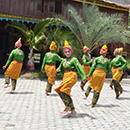Wesleyan University's Center for the Arts Receives Association of Performing Arts Presenters Grant to Support the Muslim Women Voices Project during 2014-2015 Season

Receives Association of Performing Arts Presenters Grant
to Support the Muslim Women Voices Project during 2014–2015 Season
One of only six campus presenting organizations in the country selected to receive funding to support
interdisciplinary collaborations that expand awareness and understanding of Muslim societies through the performing arts
Middletown, Conn.—Wesleyan University’s Center for the Arts has received a grant award of $200,000 from the Association of Performing Arts Presenters (APAP) to support the Muslim Women Voices Project during the 2014-2015 season. APAP, the national service and advocacy organization dedicated to developing and supporting a robust performing arts presenting field and the professionals who work within it, has announced that six campus presenting organizations have been awarded grants through the Building Bridges: Campus Community Engagement grants program. Funded by the Doris Duke Charitable Foundation and the Doris Duke Foundation for Islamic Art, the Building Bridges program supports U.S. presenters who are building interdisciplinary cross-campus and community collaborations that expand awareness, knowledge and understanding of Muslim cultures through the performing arts.
"An essential part of Wesleyan’s mission as a residential undergraduate institution is 'to build a diverse, energetic community of students, faculty, and staff who think critically and creatively and who value independence of mind and generosity of spirit,'" said Pamela Tatge, Director of the Center for the Arts at Wesleyan University. "This project will feature extraordinary artists from around the globe and will assist us in building a more inclusive and dynamic campus community while at the same time catalyzing important dialogues within our region."
Wesleyan's Muslim Women Voices Project will present and contextualize a series of performances in theater, music and dance by women from nine different countries over the course of the 2014-2015 season as part of the Creative Campus Initiative of the Center for the Arts. By experiencing a plurality of Muslim women’s experiences and voices in performances and residency activities, the audience will learn about the complexities that challenge what are often one-dimensional popular depictions of Muslim women, as well as stereotypes about Muslim societies and cultures generally. A series of curricular and co-curricular engagement events will include workshops, lectures, informal talks and meals with the artists. Select artists will co-create modules in courses in Religion and French Studies, and be integrated into two new courses created to contextualize the project. The project is also designed to build relationships and to engage in dialogue with Muslim-Americans both on campus and in the region to enhance mutual understanding. A theater artist will be commissioned to guide Wesleyan students and Muslim community members in creating a collaborative theatrical work as part of the Muslim Women Voices Project. The team will conduct interviews with Muslim women and weave the stories gathered into a fluid structure integrating documentary theater, talk show, cabaret and traditional storytelling. The full roster of artists will be announced in May 2014. The lessons learned, recorded interviews, short documentaries about each project component, and curriculum will be posted on the Muslim Women Voices Project website as a legacy of the project.
For the Muslim Women Voices Project, the Center for the Arts has partnered with Wesleyan’s Music Department, Dance Department, Religion Department, Psychology Department Culture and Emotion Lab, French Studies, Middle Eastern Studies Certificate Program, South Asia Studies, Feminist, Gender and Sexuality Studies, the Office of Religious and Spiritual Life, the Center for Community Partnerships, the Green Street Arts Center, the Turath House (a student program house), and the Muslim Students' Association; and with community and national partners including the Muslim Coalition of Connecticut, the Hartford Seminary, and the Al-Rawiya Foundation.
About the Association of Performing Arts Presenters
The Association of Performing Arts Presenters (APAP), based in Washington, D.C., is the national service and advocacy organization dedicated to developing and supporting a robust performing arts presenting field and the professionals who work within it. Their 1,500 national and international members represent leading performing arts centers, municipal and university performance facilities, nonprofit performing arts centers, culturally specific organizations, and foreign governments; as well as artist agencies, managers, touring companies, and national consulting practices that serve the field; and a growing roster of self-presenting artists. As a leader in the field, APAP works to effect change through advocacy, professional development, resource sharing and civic engagement. APAP is a nonprofit 501(c)3 organization governed by a volunteer board of directors and led by President & CEO Mario Garcia Durham. In addition to presenting the annual APAP/NYC conference, the world's leading forum and marketplace for the performing arts (taking place January 10-14, 2014); APAP continues to be the industry's leading resource, knowledge and networking destination for the advancement of performing arts presenting.
For more information, please visit http://www.apap365.org.
About the Doris Duke Charitable Foundation
The mission of the Doris Duke Charitable Foundation is to improve the quality of people's lives through grants supporting the performing arts, wildlife conservation, medical research and the prevention of child maltreatment, and through preservation of the cultural and environmental legacy of Doris Duke's properties.
For more information, please visit http://www.ddcf.org.
About the Doris Duke Foundation for Islamic Art
Based in New York, the Doris Duke Foundation for Islamic Art (DDFIA) is one of three operating foundations supported by the Doris Duke Charitable Foundation. The mission of DDFIA is to improve the quality of people's lives through the study, understanding and appreciation of Islamic arts and cultures. The Building Bridges Program is a national grant making program of the Doris Duke Foundation for Islamic Art, an operating foundation of the Doris Duke Charitable Foundation.
For more information, please visit http://www.ddfia.org.
